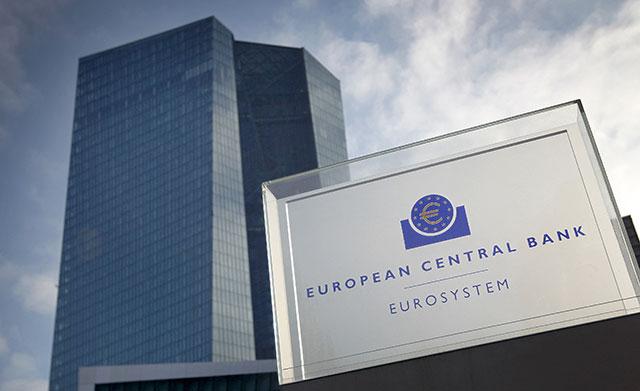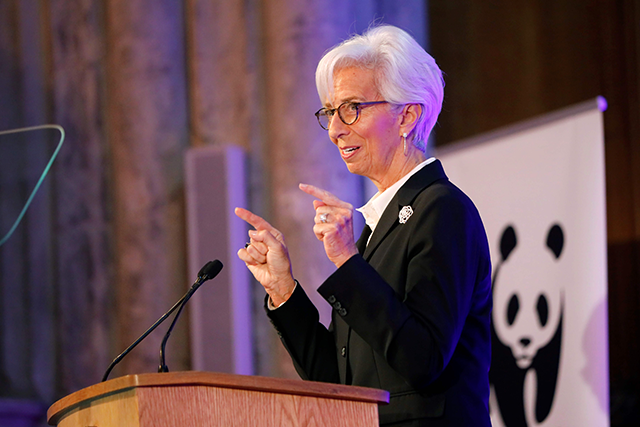You are here
ECB says 'too early' to remove support despite rebound
By AFP - Jun 10,2021 - Last updated at Jun 10,2021

This file photo taken on March 11, 2021 shows the headquarters of the European Central Bank in Frankfurt am Main, western Germany. (AFP photo)
FRANKFURT — European Central Bank (ECB) chief Christine Lagarde on Thursday said it was "too early" to consider winding down pandemic support, even as the economic recovery gathers steam and inflation surges past the bank's target.
The ECB held interest rates at record lows and made no tweaks its 1.85-trillion-euro ($2.2 trillion) pandemic emergency bond-buying scheme, aimed at keeping borrowing costs low to spur spending and investment.
Former French finance minister Lagarde said it would be "too early and premature" to discuss tightening monetary policy, saying continued support was needed to cement the rebound.
Keeping the cheap money taps open throughout the pandemic crisis "remains essential to reduce uncertainty and bolster confidence", she told reporters.
The outlook for the 19-nation zone has brightened considerably on vaccination progress and booming post-lockdown demand as businesses reopen.
"We expect economic activity to accelerate in the second half of this year," Lagarde said.
An uptick in consumer spending, strong global demand and fiscal and monetary stimulus "will lend crucial support to the recovery", she added.
But she warned that the economic healing remained fragile and strongly depended on how the pandemic evolves.
In updated forecasts on Thursday, the ECB said it now expected the eurozone economy to grow by 4.6 per cent this year, up from 4.0 per cent previously.
Inflation overshoot
Optimism about the economic recovery is complicated however by a recent surge in inflation, a problem faced by central bankers around the world.
Lagarde reiterated that the jump in eurozone consumer prices is likely to be temporary, and that the longer-term outlook for headline inflation remains subdued.
Eurozone inflation hit 2.0 per cent in May, its highest level in nearly three years and overshooting the ECB's benchmark of "close to, but below" 2.0 per cent.
The price increases have been fuelled by higher oil prices and temporary factors including shortages of raw materials and pent-up demand as different sectors emerge from shutdowns.
Core inflation, which strips out energy and other volatile items, remains muted.
The ECB's newest projections raised the inflation estimate for 2021 from 1.5 per cent to 1.9 per cent on Thursday.
The bank expects inflation to fall back, hitting 1.5 and 1.4 per cent over the following two years.
No US comparison
The United States is facing a similar dilemma, where concerns are growing that the Federal Reserve could be forced to reduce or "taper" its bond-buying scheme, or lift interest rates earlier than planned to prevent the economy from overheating.
US inflation spiked to five per cent in May, according to data released during Lagarde's press conference.
Lagarde said that although the ECB was "attentive to the global situation", the eurozone was at a different point in the recovery than the US.
"If the inflation situation in Europe is not as dramatic as in the US, those are quite unusual waters for the eurozone," said Ipek Ozkardeskaya, a Swissquote analyst.
Still, she said, "European businesses need support, and the ECB is here to provide them the support they need."
The ECB has for years maintained an ultra-loose monetary policy in a bid to drive up anaemic inflation and boost economic growth.
As well as record-low and even negative rates, it has offered super cheap loans to banks to encourage lending and investments.
On top of the PEPP bonds, it is also hoovering up 20 billion euros a month in government and corporate bonds under a pre-pandemic asset purchasing scheme.
The ECB announced in March that it would accelerate the monthly pace of PEPP purchases, to calm market jitters about rising bond yields at the time.
Observers expect the faster pace to be maintained until September, when the ECB could start reducing the purchases. The emergency scheme is set to run until the end of March 2022.
Asked whether ECB governors had already broached the topic of when to start "tapering" the purchases, Lagarde said it was "too early" for such a discussion.
Related Articles
FRANKFURT — The European Central Bank (ECB) on Thursday kept its massive pandemic-fighting stimulus package in place, in a bid to help Europ
FRANKFURT AM MAIN — European Central Bank (ECB) governors are expected to refrain from doling out fresh stimulus medicine, hoping EU leaders
FRANKFURT AM MAIN — A resurgence in the coronavirus pandemic and a bumpy start to vaccination drives are likely to weigh on the minds of Eur

















